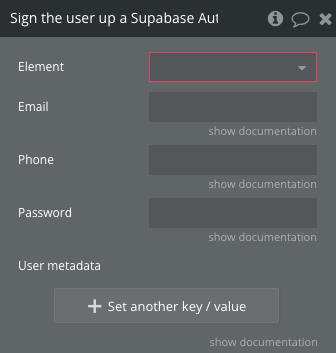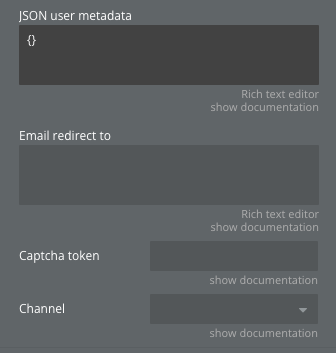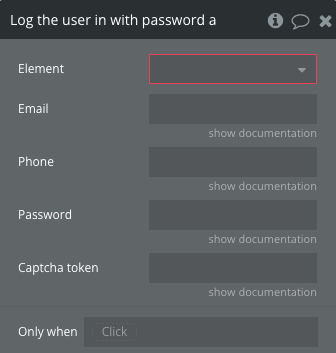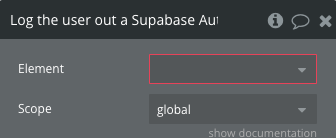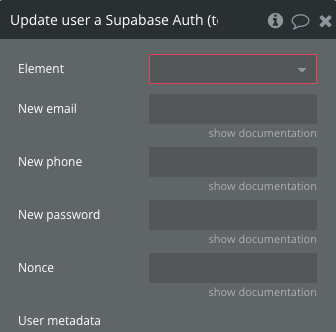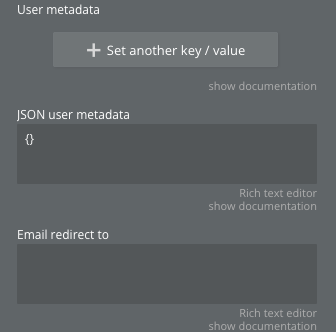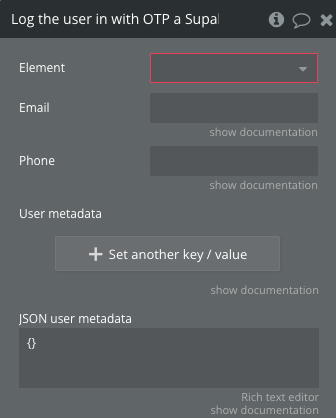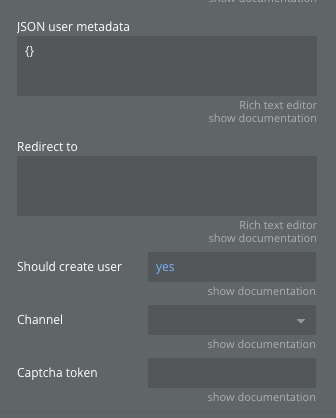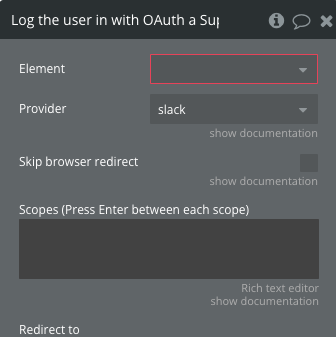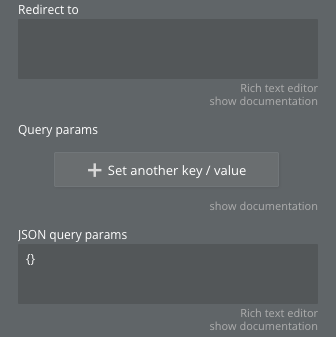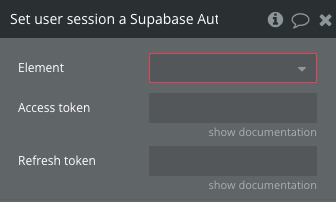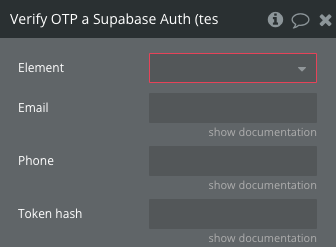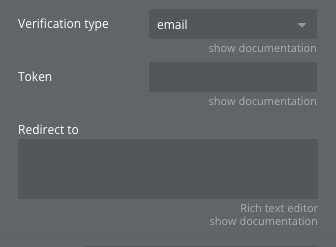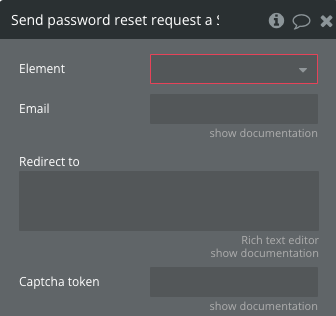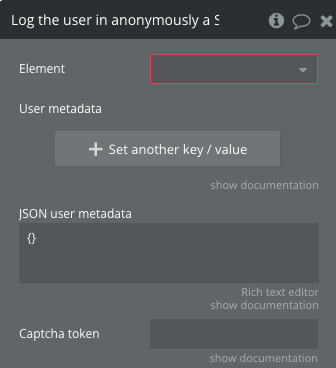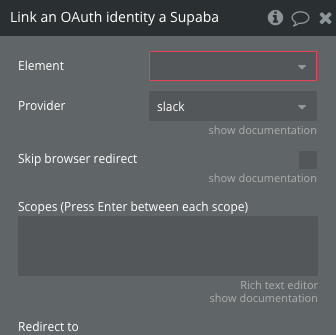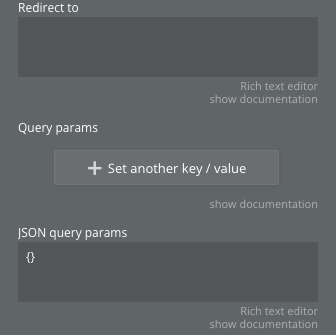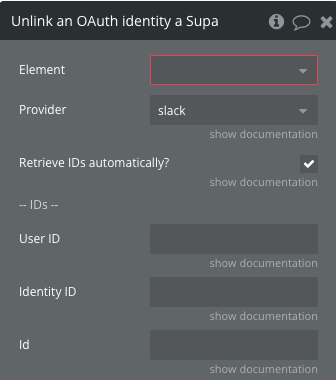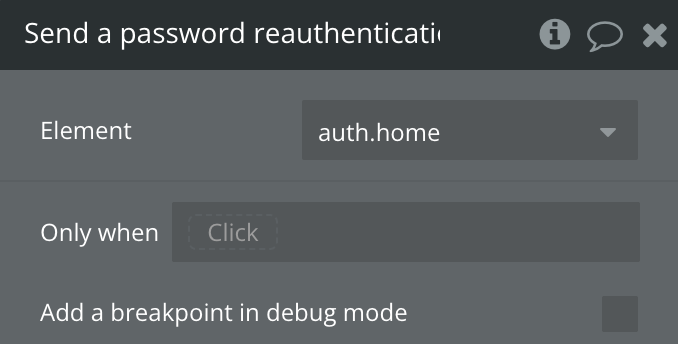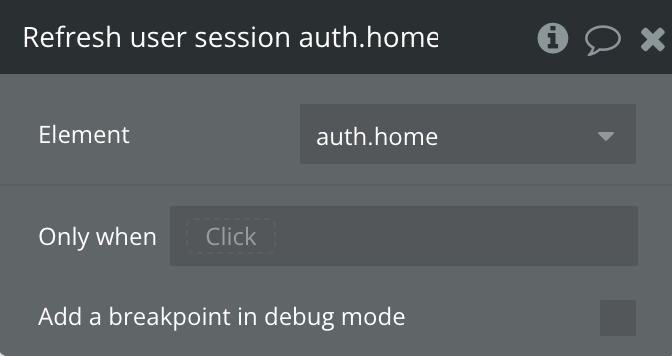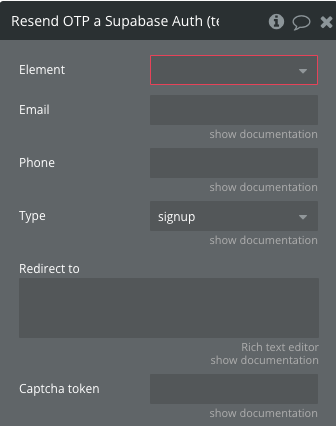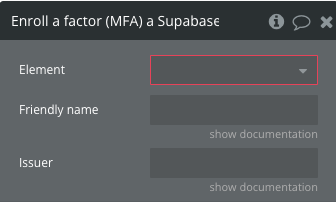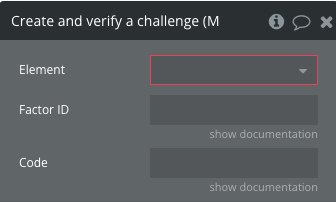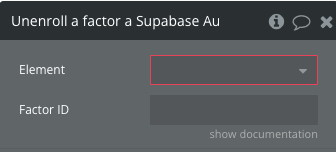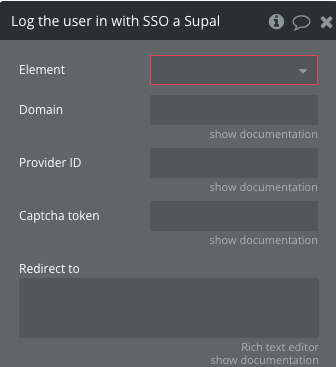Manage your users through Supabase Auth service.
In this section, we cover the essential aspects of user authentication within your Bubble.io application using the Supabase plugin.
Note: Please ensure that a Supabase Auth component is visible on every page of your app.
This is crucial because this component initiates the connection with your Supabase
instance. Note that you can have multiple instances of the Supabase Auth component.
Setup
Add the element
Supabase Auth to your page.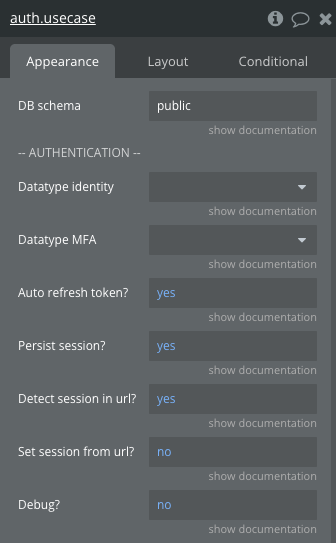
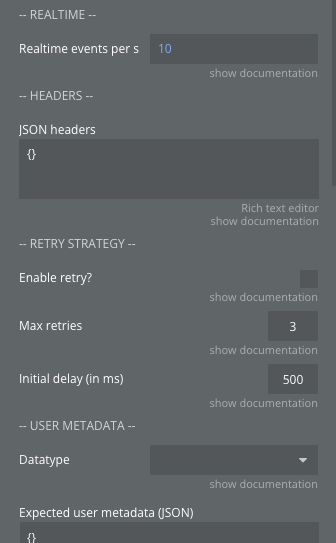
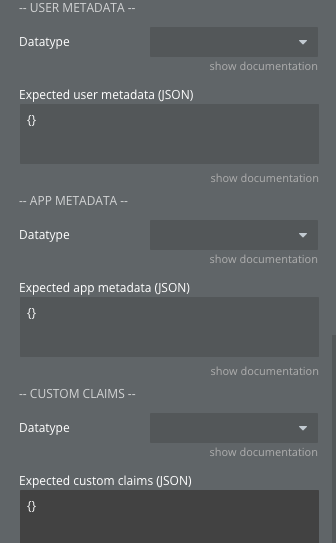
Fields:
Title | Description | Type |
DB Schema | The Postgres schema which your tables belong to. | Text |
Datatype identity | Optional. Select "Identity (Supabase)" for this field. This type is automatically defined by the Supabase plugin and allows exposing identities linked to the current user. | App type |
Datatype MFA | Optional. Select "MFA (Supabase)" for this field. This type is automatically defined by the Supabase plugin and allows exposing MFA factors. | App type |
Auto Refresh Token? | Automatically refreshes the token for logged-in users. | Yes/No |
Persist Session? | Whether to persist a logged-in session to storage. | Yes/No |
Detect Session In Url? | Detect a session from the URL. | Yes/No |
Set Session From Url? | When this option is enabled, the plugin automatically attempts to set the user session based on values retrieved from the URL (after an email or OAuth redirect). Otherwise, you'll need to manually trigger the Set User Session action, such as on page load. | Yes/No |
Real-Time Events Per Second | Rate limiting. The default is 10, which means that the client can send one event every 100 milliseconds. | Number |
JSON headers | Optional headers for initializing the client. They will be automatically included in action calls to your Supabase instance. | JSON |
Enable retry? | Enables the retry mechanism for failed network requests. If set to true, the plugin will attempt to retry the request upon encountering client-side network errors. Defaults to false. | Yes/No |
Max retries | The maximum number of retry attempts after a failed request. If not provided, it defaults to 3 retries. | Number |
Initial delay (in ms) | The initial delay in milliseconds before the first retry attempt. Subsequent retries will use exponential backoff, meaning the delay will double after each retry (e.g., if set to 500, the next retry will be after 500ms, then 1000ms, and so on). Defaults to 500 ms. | Number |
Datatype (User metadata) | Optional. Data type that you have initialized through the API connector. Allows you to retrieve the user metadata you defined during user signup. | App type |
Expected user metadata (JSON) | Optional. By default, the plugin attempts to automatically retrieve the user metadata format based on the type defined in the API connector. To prevent any retrieval failures and ensure that the plugin can properly publish results from Supabase, we recommend you paste your schema into this field. This schema should match the one you have already entered in the API connector. | JSON |
Datatype (Custom claims) | Optional. Data type that you have initialized through the API connector. Allows you to retrieve the custom claims you defined on your Supabase project. | App type |
Expected custom claims (JSON) | Optional. By default, the plugin attempts to automatically retrieve the custom claims format based on the type defined in the API connector. To prevent any retrieval failures and ensure that the plugin can properly publish results from Supabase, we recommend you paste your schema into this field. This schema should match the one you have already entered in the API connector. | JSON |
Exposed states
Name | Description | Type |
Is Logged In | Indicates if user is logged-in or not. | Boolean |
User ID | Unique identifier of the current user. | Text |
User Email | Email address of the current user. | Text |
New email | New email address when changing email. | Text |
Email change sent at | Timestamp when email change request was sent. | Date/Time |
User Email Confirmed At | Timestamp when user email was confirmed. | Date/Time |
User Phone | Phone number of the current user. | Text |
New phone | New phone number when changing phone. | Text |
User Last Sign In At | Timestamp of the last user sign-in. | Date/Time |
User Confirmed At | Timestamp when user account was confirmed. | Date/Time |
User Phone Confirmed At | Timestamp when user phone was confirmed. | Date/Time |
User Created At | Timestamp when user account was created. | Date/Time |
User Updated At | Timestamp when user account was last updated. | Date/Time |
User Aud | Audience claim from the JWT token. | Text |
User Role | Role assigned to the current user. | Text |
Access Token | JWT access token. | Text |
Refresh Token | JWT refresh token. | Text |
Token Type | Type of the authentication token. | Text |
Expires At | Timestamp when the token expires. | Date/Time |
Expires In | Time in seconds until token expiration. | Number |
Is anonymous? | Indicates if the user is anonymous. | Boolean |
Identities | List of identities linked to the current user. | List |
User metadata | Current user metadata. | Object |
Custom claims | Current user custom claims. | Object |
MFA | Current user MFA factors. | List |
App Metadata Provider | The provider used to authenticate the user (e.g. email). | Text |
App Metadata Providers | List of authentication providers. | List |
Status Code | Authentication status code (e.g. 'success', 'failed'). | Text |
Status Message | Message returned by the Supabase authentication service. | Text |
Auth Event | The last authentication event received. | Text |
User Metadata Avatar Url | Avatar URL from user metadata (OTP/OAuth). | Text |
User Metadata Email | Email from user metadata (OTP/OAuth). | Text |
User Metadata Email Verified | Indicates if email is verified (OTP/OAuth). | Boolean |
User Metadata Full Name | Full name from user metadata (OTP/OAuth). | Text |
User Metadata Iss | Issuer claim from user metadata (OTP/OAuth). | Text |
User Metadata Name | Name from user metadata (OTP/OAuth). | Text |
User Metadata Phone Verified | Indicates if phone is verified (OTP/OAuth). | Boolean |
User Metadata Picture | Picture URL from user metadata (OTP/OAuth). | Text |
User Metadata Provider Id | Provider ID from user metadata (OTP/OAuth). | Text |
User Metadata Sub | Subject claim from user metadata (OTP/OAuth). | Text |
URL Access Token | Access token extracted from URL (after redirect). | Text |
URL Refresh Token | Refresh token extracted from URL (after redirect). | Text |
URL Type | Token type extracted from URL (after redirect). | Text |
URL Error | Error message extracted from URL (after redirect). | Text |
URL Error Code | Error code extracted from URL (after redirect). | Text |
URL Error Description | Error description extracted from URL (after redirect). | Text |
Error Slug | Simple text describing the authentication error. | Text |
Error Code | Unique code (number) for the authentication error. | Number |
Login with password errors
Description | Code | Slug |
Invalid login credentials | 100 | invalid-login-credentials |
Email not confirmed | 101 | email-not-confirmed |
Phone number not confirmed | 102 | phone-number-not-confirmed |
Email login disabled | 103 | email-login-disabled |
Phone number login disabled | 104 | phone-number-login-disabled |
Database error | 105 | database-error |
Error generating JWT token | 106 | error-generating-jwt-token |
Captcha verification process failed | 107 | invalid-captcha |
Signup errors
Description | Code | Slug |
Email already in use | 200 | email-already-in-use |
Signups not allowed for this instance | 201 | signups-not-allowed |
Password should be at least X characters | 202 | password-too-short |
Only an email address or phone number should be provided on signup. | 203 | only-email-or-phone-number |
Invalid channel, supported values are sms or whatsapp | 204 | invalid-channel |
PKCE not supported for phone signups | 205 | pkce-not-supported-for-phone-number |
Email signups are disabled | 206 | email-signup-disabled |
Database error finding user | 207 | database-error-signup |
Phone signups are disabled | 208 | phone-number-signup-disabled |
User already registered | 209 | user-already-registered |
Update errors
Description | Code | Slug |
Auth session is missing | 300 | auth-session-missing |
Login anonymously errors
Description | Code | Slug |
Captcha verification process failed | 400 | invalid-captcha |
Element Events
Name | Description |
Supabase is loaded | Triggered when the Supabase plugin has been loaded. |
Auth State Changed | Triggered when receiving a new authentication event from Supabase. |
Auth Error Received | Triggered when receiving an authentication error from Supabase. |
Signed Up | Triggered when a user successfully signs up. |
Signed Up Error | Triggered when an error occurs during the user sign-up process. |
Sign In | Triggered when a user successfully signs in. |
Sign In Error | Triggered when an error occurs during the user sign-in process. |
Signed Out | Triggered when a user successfully signs out. |
Signed Out Error | Triggered when an error occurs during the user sign-out process. |
User Updated | Triggered when a user's account information is successfully updated. |
User Updated Error | Triggered when an error occurs while updating a user's account information. |
Verify OTP | Triggered when an OTP has been successfully verified. |
Verify OTP Error | Triggered when an OTP is not valid. |
Sign in with OTP | Triggered when a user has successfully signed in with an OTP. |
Sign in with OTP error | Triggered when an error occurs while signing in with an OTP. |
OTP resend | Triggered when an OTP has been successfully resent. |
OTP resend error | Triggered when an error occurs while resending an OTP. |
Identity linked | Triggered when an identity is linked. |
Identity linked error | Triggered when an error occurs while linking identity. |
Identity unlinked | Triggered when an identity is unlinked. |
Identity unlinked error | Triggered when an error occurs while unlinking identity. |
Send password reset request | Triggered when a password reset request has been successfully sent. |
Send password reset request error | Triggered when an error occurs while sending a password reset request. |
Sign in anonymously | Triggered when a user successfully signs in anonymously. |
Sign in anonymously error | Triggered when an error occurs during the user's attempt to sign in anonymously. |
Send password reauthentication nonce | Triggered when a password reauthentication nonce has been successfully sent. |
Send password reauthentication nonce error | Triggered when an error occurs while sending a password reauthentication nonce. |
Refresh user session | Triggered when the user session has been refreshed. |
Refresh user session error | Triggered when an error occurs while refreshing the user session. |
Set user session | Triggered when the user session has been set. |
Set user session error | Triggered when an error occurs while setting the user session. |
MFA enroll | Triggered when a user has successfully enrolled in MFA. |
MFA enroll error | Triggered when an error occurs while enrolling a user in MFA. |
MFA challenge | Triggered when a MFA challenge is required. |
MFA challenge error | Triggered when an error occurs while challenging a user for MFA. |
MFA verify | Triggered when a user has successfully verified their MFA factor. |
MFA verify error | Triggered when an error occurs while verifying a user's MFA factor. |
MFA unenroll | Triggered when a user has successfully unenrolled from MFA. |
MFA unenroll error | Triggered when an error occurs while unenrolling a user from MFA. |
Note: Explore our demo app to see how to effectively use the auth component in your app.

